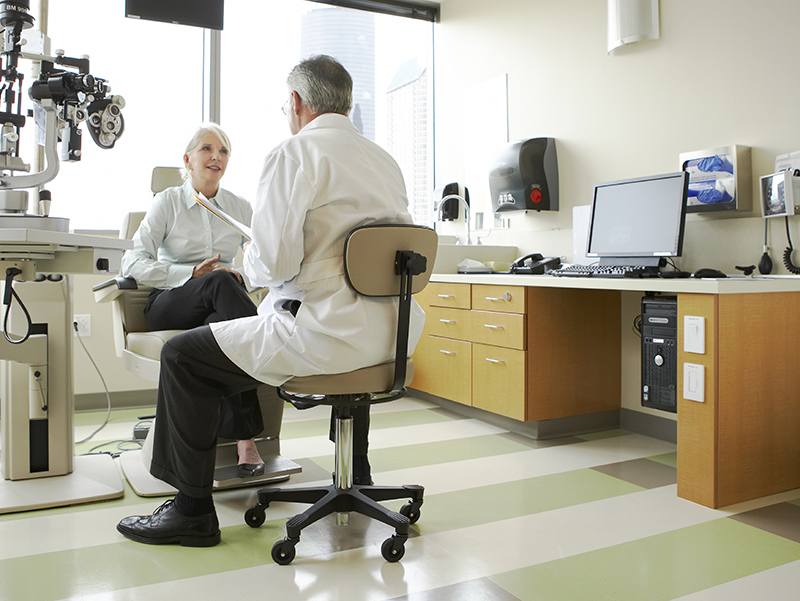Vision health is not always one of your utmost priorities. However, protecting your eyes should be very important to you. Your eyes constantly encounter stressors that can irritate them, harm them, or even destroy them. Protection is not only simple, but it’s also vital for your quality of life. Your eyes capture the moments you’ll remember your whole life through.
What type of preventive injuries can occur to my vision?
Some of the following issues can arise when you don’t take proper vision precautions:
- Corneal abrasions
- Scratches to the surface of your eye can physically hurt and also make vision blurry. You can get a scratch simply by having a small piece of debris drop into your eye, so making certain that you protect yourself can prevent undue pain.
- Blunt trauma
- Being hit with anything directly in the eye cannot only be excruciating but can lead to vision loss.
- Penetrating injuries
- Objects breaking the eye margins can blind you. Rupturing the eye can destroy your vision and disable other brain functions.
- Inflamed iris
- Any pollutant can agitate the eye’s focus element which controls the pupil’s dilation. Inflammation can cause burning and agitation, not to mention disease.
- Eye socket fracture
- Not only can the eye socket break, the bones inside can penetrate the eye periphery or result in eye displacement. Having an eye fracture often results in reconstructive surgery of the orbital.
What can I do to protect my eyes?
- Wear headgear
- When you are in a trade with dangerous machinery or possible projectiles, it’s logical and simple: protecting your eyes is a necessity. You must wear protective headgear to keep them from harm.
- If you are dealing with extreme light, as a welder for example, wear your helmet and keep your eyes safe from the dangerous flames and brilliant radiating glow with the eye shield.
- When you are playing sports, wear a helmet. According to Prevent Blindness America, “More than 25,000 people seek treatment for sports-related eye injuries each year.” The National Eye Institute has found that baseball accounts for the most eye injuries in children 14 and under, while 15-24 year olds obtain most eye injuries in basketball.
- Wear protective glasses
- Regular eyeglasses do not provide adequate protection to the oculus. They can simply shatter upon impact, leading to fragments that may penetrate the eye field. When you are participating in sports, wearing approved protective sports eyewear is essential.
- Ocular trauma can be prevented by simply wearing protective eyewear regardless of the need for prescriptive lenses. According to The Vision Council, polycarbonate lenses specifically for sports use are held to impact standards by the American Standards for Testing and Materials – be certain to use these specific products.
- Remember that wearing the wrong kind of eye protection is sometimes worse than wearing no protection at all. For example, chemists and lab workers need to wear goggles to prevent them from airborne poisons. Line workers are best helped with eyeglasses with side shields in situations of flying dust and debris. Keeping foreign bodies out of the eyes is imperative to vision health.
- Be proactive with your food choices
- Yes, vitamins and minerals do improve your chances of having healthy eyes. Choose green, leafy vegetables as a part of your diet.
- Lutein and Zeaxanthin can help protect macular health. You can add these carotenoids into your diet by eating eggs and spinach. See our article on these nutrients.
- Add Omega-3 into your diet by eating fatty fish, like salmon.
- Wash your hands
- Simply practicing good hygiene can assist your eyes. Often, rubbing your eyes when they have been exposed to viruses or bacteria contributes to the spread of conjunctivitis (pink eye).
- Getting any extraneous fragments, liquids, etc. off of your palms and fingers reduces the potential for corneal abrasion.
- Sanitizing your hands after being around illness prevents the proliferation of communicable illnesses.
- Stop smoking
- Smoke can irritate your eyes and cause dry eye
- Smoke also contributes to age-related macular degeneration and cataract development.
- Higher chance of diabetic retinopathy can result from cigarette usage.
- Smoking can also contribute to color blindness.
- Monitor your electronic use
- Blue light glasses can assist with preventing harm to the eyes from UV light
- People blink less when they are viewing electronic screens. Take a break and look away from the computer and phone.
- Wear only updated eyeglasses
- Wearing expired prescription lenses causes eye strain. Be certain you have the best vision by ensuring your doctor’s recommended eyeglass strength.
- Follow proper care directions for your contact lenses
- Leaving your contacts in your eyes for longer than recommended can dry your eyes and prevent the much-needed oxygen to get to your cornea.
- Wearing contacts for too long can irritate eyes and even cause eye pain and sensitivity.
- Clean your contacts and disinfect them regularly. Contact lens use increases the likelihood of keratitis (corneal ulcers) and pink eye.
- Get regular eye exams
- Make sure that you are going to the optometrist annually
If you have problems developing with your vision, get to the doctor. Your eye health is certainly worth the time.
